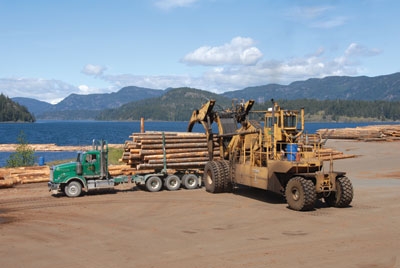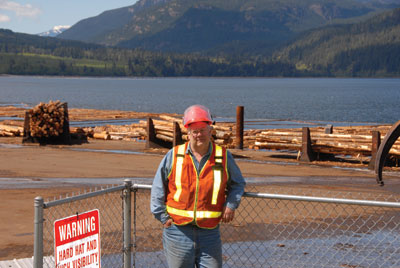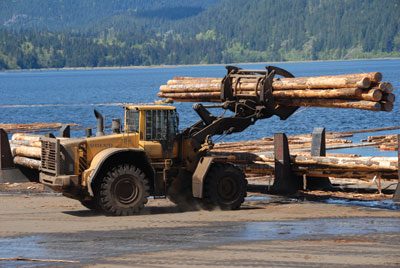
Features
Harvesting
Logging Profiles
Sorting it Out
Don McMillan sees a huge volume of logs pass by his office window every day. When asked about specifics, he comes back with a number that is well north of 3,000 cubic metres and anywhere from 80 to 90 truckloads on a 14-hour shift. For McMillan, these figures are a positive sign. His company has the contract to operate the North Island Log Sort on northern Vancouver Island for TimberWest, which is Western Canada’s largest private timber and land management company. And big volumes of logs entering the sort, typically means things are moving in the right direction for McMillan, his partner Hugh Anderson, their crew, and TimberWest.
November 10, 2011 By Bill Tice
 Don McMillan sees a huge volume of logs pass by his office window every day. When asked about specifics
Don McMillan sees a huge volume of logs pass by his office window every day. When asked about specifics“Right now, we are on track for about 600,000 cubic metres for the year,” says McMillan. “We are experimenting with a shift structure that gives us 14 hours per day of production from Monday to Friday, and the weekends for clean-up and maintenance.”
But for McMillan, it’s not only about the cubic metres. “The volume is only one aspect of this business,” he explains. “Some months we will do almost 100 different sorts and on some days, we will handle up to 5,500 logs. What we are really doing here is handling pieces and all of the coordination that goes with that.”

With more than 30 years in B.C.’s coastal forest industry, it’s a business McMillan knows well. He started out in 1979 as a summer student while completing his forestry degree at the University of British Columbia and then spent the next 20 plus years working for a myriad of owners at the company that today is International Forest Products (Interfor). Working his way up to the position of area manager for Interfor, he was based out of Ucluelet, B.C. and was responsible for the West Coast, which incorporated Nootka Sound, Barkley Sound, and Clayoquot Sound. Then in 2005 when Interfor made a corporate decision to leave the West Coast, he decided to stay, starting up his own businesses – Clayoquot Forest Management Ltd. and Clayoquot Custom Log Sorting.
Sort Background
The TimberWest North Island Log Sort was originally built in the early 2000s with McMillan’s company officially taking over the day-to-day operation of the sort in February 2009.
TimberWest owns the sort and logs coming into the sort are primarily from TimberWest land, or in some cases are purchased wood that TimberWest uses to supplement its fibre flow. Four main northern Vancouver Island contractors deliver a bulk of the logs to the sort for Timber West. “95% of the logs coming into the sort arrive by truck,” says McMillan. “The remaining 5% is generally an equal split between barge and boom.“
Production Process
The process that takes place at the sort varies. Some wood comes across the scale and is what McMillan terms, “Wrap and Splash.” This is wood that is weighed, strapped and sent into the water. Deck wood is laid out on the ground and then sorted into piles by hydraulic loaders.
Trucks are accepted at the sort from 6 a.m to 5 p.m. All trucks come down the steep road from the main Island highway to the sort’s entrance. From there, they radio the Wagner loader operator as he controls the sort’s log flow. If they have a “Wrap and Splash” load they proceed to the scale where the scaler enters the information into the computer, and the load is weighed, tagged and wrapped and put into the water by the Wagner or laid out as a check scale load.
For deck wood, the binders are removed and then the Wagner unloads the truck and moves the logs to an area where they can be spread out. The logs are then graded, scaled, stamped and bucked as needed. Hydraulic loaders are then used to sort the logs and wheel loaders transport the sorted logs to bunks. Each bundle is carefully checked for sorting errors, piece count and to make sure it is properly built before being tagged for identification. The paperwork is then completed and the bundles are strapped with 3/8 in. galvanized strands. The Wagner then picks up the bundles and checks the weight with an on-board sensor that alerts the operator if the load is too heavy, before moving the load to the water where a boom crew takes over. If the logs are too heavy, some wood must be removed until they meet the weight specification. The majority of logs leave the sort by water while some are shipped to local mills by truck.
In addition to being sorted by species, diameter, quality and length, the logs are separated for domestic or export shipments. Bundles of logs for export have to be within a specific weight range for loading on to ships. “Our goal for this wood is to have well packaged bundles that meet the weight tolerances,” explains McMillan. “Typically, we are looking for a bundle weight based on the sort and the species as some species are drier, and therefore lighter, than others.”
Using old growth fir as an example, McMillan says at this time of year, it will run at about 750 kg per cubic metre. They target 27 to 30 cubic metres per bundle, so at that weight they will be on track. For domestic wood, the logs are sorted into bundles ranging in size from 40 to 50 cubic metres and weight generally isn’t a factor.

The main equipment fleet at the sort includes the massive Wagner loader, which is a 4100 model that McMillan’s company bought used from the B.C. interior; two wheel loaders – a Volvo 150 and a Volvo 180; a Volvo 2421 log loader with a clam grapple; and a Hitachi EX200 log loader. McMillan says he and his partner Hugh Anderson (HC Contracting Inc), sourced all of the equipment and had to “start from scratch” when the contract was awarded. Their companies also run a 600 cubic metre per day stump to dump logging operation in Chemainus, B.C. for the Ditidaht First Nation, which includes falling, yarding, loading, hauling, sorting and booming. They also run another stump to dump operation on Sonora Island for TimberWest.
For McMillan, running his own logging and sorting businesses is a big change from working for the big coastal companies, but as another load of logs goes by his office window at the TimberWest sort, he concedes that things are good. “We’ve got long term contracts, it’s secure work, and TimberWest is just great to work with,” he concludes.
Print this page